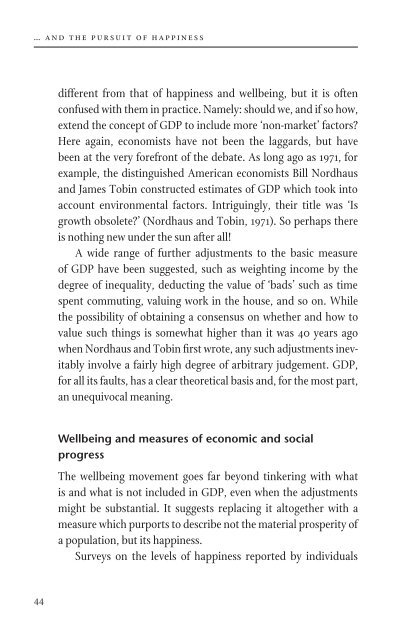… and the Pursuit of Happiness - Institute of Economic Affairs
… and the Pursuit of Happiness - Institute of Economic Affairs
… and the Pursuit of Happiness - Institute of Economic Affairs
You also want an ePaper? Increase the reach of your titles
YUMPU automatically turns print PDFs into web optimized ePapers that Google loves.
<strong>…</strong> <strong>and</strong> <strong>the</strong> pursuit <strong>of</strong> happiness<br />
<strong>the</strong> folly <strong>of</strong> wellbeing in public policy<br />
different from that <strong>of</strong> happiness <strong>and</strong> wellbeing, but it is <strong>of</strong>ten<br />
confused with <strong>the</strong>m in practice. Namely: should we, <strong>and</strong> if so how,<br />
extend <strong>the</strong> concept <strong>of</strong> GDP to include more ‘non-market’ factors?<br />
Here again, economists have not been <strong>the</strong> laggards, but have<br />
been at <strong>the</strong> very forefront <strong>of</strong> <strong>the</strong> debate. As long ago as 1971, for<br />
example, <strong>the</strong> distinguished American economists Bill Nordhaus<br />
<strong>and</strong> James Tobin constructed estimates <strong>of</strong> GDP which took into<br />
account environmental factors. Intriguingly, <strong>the</strong>ir title was ‘Is<br />
growth obsolete?’ (Nordhaus <strong>and</strong> Tobin, 1971). So perhaps <strong>the</strong>re<br />
is nothing new under <strong>the</strong> sun after all!<br />
A wide range <strong>of</strong> fur<strong>the</strong>r adjustments to <strong>the</strong> basic measure<br />
<strong>of</strong> GDP have been suggested, such as weighting income by <strong>the</strong><br />
degree <strong>of</strong> inequality, deducting <strong>the</strong> value <strong>of</strong> ‘bads’ such as time<br />
spent commuting, valuing work in <strong>the</strong> house, <strong>and</strong> so on. While<br />
<strong>the</strong> possibility <strong>of</strong> obtaining a consensus on whe<strong>the</strong>r <strong>and</strong> how to<br />
value such things is somewhat higher than it was 40 years ago<br />
when Nordhaus <strong>and</strong> Tobin first wrote, any such adjustments inevitably<br />
involve a fairly high degree <strong>of</strong> arbitrary judgement. GDP,<br />
for all its faults, has a clear <strong>the</strong>oretical basis <strong>and</strong>, for <strong>the</strong> most part,<br />
an unequivocal meaning.<br />
Wellbeing <strong>and</strong> measures <strong>of</strong> economic <strong>and</strong> social<br />
progress<br />
The wellbeing movement goes far beyond tinkering with what<br />
is <strong>and</strong> what is not included in GDP, even when <strong>the</strong> adjustments<br />
might be substantial. It suggests replacing it altoge<strong>the</strong>r with a<br />
measure which purports to describe not <strong>the</strong> material prosperity <strong>of</strong><br />
a population, but its happiness.<br />
Surveys on <strong>the</strong> levels <strong>of</strong> happiness reported by individuals<br />
have been carried out over a few decades in most Western countries.<br />
The recorded levels <strong>of</strong> happiness fluctuate from year to year,<br />
but in general <strong>the</strong>re is no apparent trend, ei<strong>the</strong>r up or down. Over<br />
<strong>the</strong> same period, average material st<strong>and</strong>ards <strong>of</strong> living, measured<br />
by real GDP per head, have shown a very clear upward trend.<br />
This finding is repeated endlessly <strong>and</strong> appears to have made<br />
an impression on many people. We see <strong>the</strong> level <strong>of</strong> happiness over<br />
time rumbling along showing no obvious trend. By contrast, <strong>the</strong>re<br />
is GDP per head bounding ahead, soaring into <strong>the</strong> stratosphere.<br />
As a result, many people believe that ‘money does not buy you<br />
happiness’.<br />
Time series data do indeed appear to show that nations do<br />
not get happier over time as <strong>the</strong>y get richer. In contrast, happiness<br />
is positively correlated with individual income within a given<br />
country at any point in time: <strong>the</strong> rich generally report greater<br />
happiness than <strong>the</strong> poor. This, <strong>the</strong> so-called Easterlin paradox,<br />
named after <strong>the</strong> doyen <strong>of</strong> happiness studies, Richard Easterlin, is<br />
also discussed at length in <strong>the</strong> happiness literature. An implication<br />
which is widely drawn is that if we do not get happier as we<br />
get richer, this effect must be due to <strong>the</strong> pernicious psychological<br />
effects <strong>of</strong> inequality.<br />
These findings are used to recommend ‘progressive’ policies<br />
in <strong>the</strong> name <strong>of</strong> equality, such as progressive tax rates <strong>and</strong> wealth<br />
redistribution. Griffith (2004), for example, in <strong>the</strong> Boston College<br />
Law Review, stated that ‘happiness research is consistent with <strong>the</strong><br />
strongest justification for adopting a progressive tax structure’.<br />
This may be thought an obscure journal, but a Google search <strong>of</strong><br />
<strong>the</strong> phrase ‘Griffiths progressive taxation’ yields 91,900 sites <strong>and</strong><br />
<strong>the</strong> article has generated a large literature. In <strong>the</strong> UK, <strong>the</strong> New<br />
<strong>Economic</strong>s Foundation is one <strong>of</strong> many bodies which base <strong>the</strong>ir<br />
44 45












